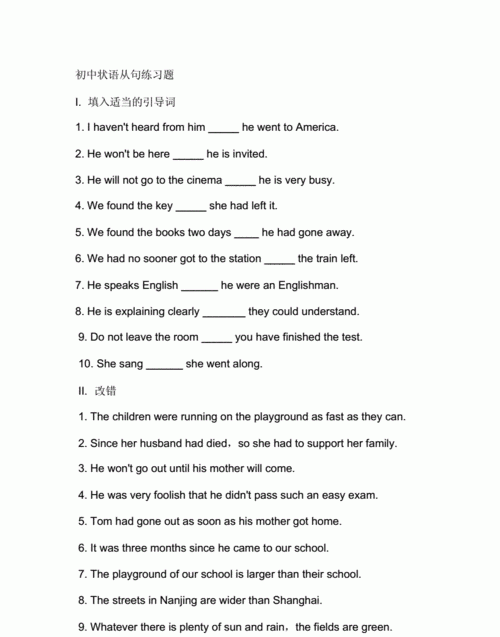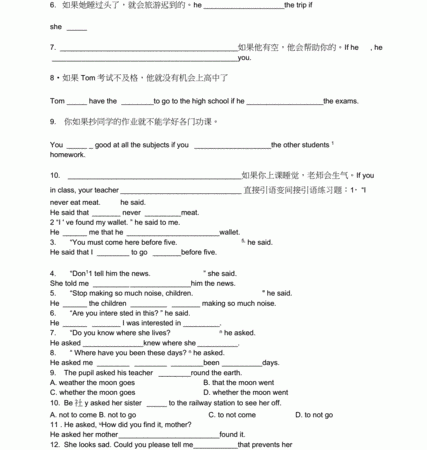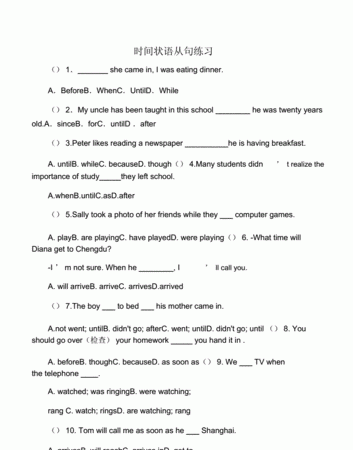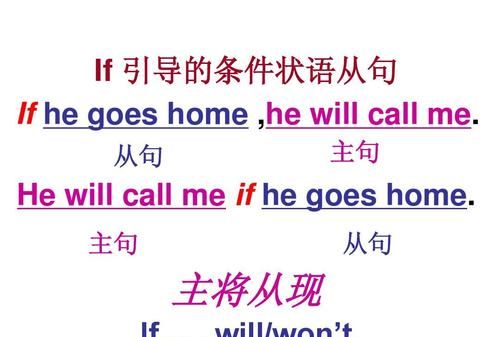本文目录
状语从句的九种常见类型
一、时间状语从句:
1、 连接词when、while、as
⑴when ①正当…时候 be about to…ving…
②从句动词先于或后于主语动作
⑵while: 可表示对比(从句只用连续性动词)
⑶as: “一边一边”“随着”
省略句中: eg: As time goes on…随着时间的推移
As a boy,hewao hopeless at English.
2、 before,after
before常用句型:It is/was/will be…before
eg: It will be 5 years before we meet again.
3、 till,until
①用于肯定句中“直到…为止”,主句谓语为持续性动词
②用于否定句中“直到…才”,主句谓语为短暂性动词(until,till可用before代替)
③Not until位于句首 倒装
④强调句型只用until
二、地点状语从句:where,wherever,everywhere
也可引导定语从句:
状语从句:We shall go where the condition are poor.
定语从句:We shall go the place where the condition are poor.
三、原因状语从句
1、because\since\as
⑴①用why提问
②强调句中
③关联词“not…but”
④与“just”等副词连用 eg:You shouldn’t any only because you had much.
⑵since引导从句常放句首,往往表示对方已知的让步原因关系,主从时态一般相同
⑶as从句放句首
2、now(that) 既然
3、considering that,seeing (that):与since,now that意相近: “鉴于…”“考虑到…”
4、not that…,but that…“不是因为…而是因为…”
四、目的状语从句
1、that,so that,in order that“为了,以便”
⑴从句中往往出现情态动词:can\could\may\might
⑵当主从句的主语一致时,可转换为相应动词不定式结构:so as to\in order to
2、in case,for fear that,lest“以防、以免、万一..”从句是肯定句
五、结果状语从句
1、so,that,so that
so that可以引导结果状语从句和目的状语从句,区别在于:目的状从中有情动(结果状从前有“,”号)
2、so…that
such a\an +形+单名=so+形+a\an+单名 “如此…以至于”
3、such…that
such…that(状从)
such…as(定从)
4、such that (是这样…以致)
六、条件状语从句:主句中用一般将来时,从句中用一般现在时或一般过去时
1、if正面条件“如果”
2、unless. 反面条件=if not 主句为否定意味,从句为肯定句(从句也可用否定结构)
unless做介词 “除非,如果不”
3、so\as long as,on condition that “条件是…”“只要..”
4、in case既可引导目的状,又可引导条件状=”if it happened that…”
5、providing,provided that, suppsing,suppose (that),given (that) “如果,只要,假如”
七、方式状语从句
1、as,just as
“如…”“正如…一样”Do just as you like
2、as if, as though (虚拟语气)
八、比较状语从句
1、as…as,the same as. 否定句用not so\as…as,not the same as
从句中常用省略句: eg:He runs as fast as he can.
2、than
3、the more…the more…“越…越…”
4、more than
九、让步状语从句
1、 although,though.句中不出现but,可出现still\yet(副词)
though的位置较灵活,可倒装
2、even if,even though“即使” even if表主观,时态往往用于将来
even though通常表客观上的,往往表过去事实
3、 no matter wh…只用于让步状语从句
wh..ever 让步状从/名词性从句
4、as特殊倒状
5、while,whereas突出对比
6、if(=even if) 强调部分(n.\adj.\adv.\v.) +as+主+谓(可以是情动)
1. I get to Pairs, I’ll call you up at the airport.
A.Since B.While C.Once D.Although
2. the headmaster comes, we won’t discuss this plan.
A. Unless B.If not C.Except D.Whether
3.Bill must have been away from the office. how many times I phoned him, nobody answered it.
A.Whatever B.No matter
C.In spite of D.Though
4.I had been to Beijing long you visited it. A.before B.till C.after D.when
5. , he is good at drawing.
A.To be a child B.A child as he is
C.As a child D.Child as he is
6.Don×t be discouraged you have fallen behind others.
A.whether B.as if C.even if D.however
7. We can get there on time the car doesn’t break down.
A. while B. as long as C. so that D. even if
8. The vase on the left is than the one on the right,and not .
A. more nicer;so expensive
B. much more better;as expensive
C. nicer;as expensive
D. better;such expensive
9. It wasn’t long he joined the job.
A.that B.before C.until D.and
10. These planes can fly than the old ones.
A.as fast three times B.three times as fast
C.three times fast D.three times faster
11. had the bell rung the students took their seats.
A.Hardly;when B.No sooner;when
C.Hardly;than D.No sooner;then
12. many times,but he still couldn’t understand it.
A.Having been told B. Though had been told
C. He was told D. Having told
13. we have come, let’s stay and enjoy it.
A. For B.As C. Because D. Since
14.You’d better do you are required.
A. like B.which C.that D.as
15. that none of us could follow him.
A. He spoke very fast B. So fast he spoke
C. Too fast he spoke D. So fast did he speak
16.I’ll start early, it may be dark.
A. however B.whether C.if D.though
17. the baby fell asleep the room.
A. After;did the mother leave
B. Not until;did the mother leave
C. Not until;the mother left
D. Soon after;the mother had left
18. the day went on, the weather got worse.
A. With B. Since C. As D. While
19. He can×t have gone out, the light is still on.
A. because B. since C. as D. for
20. I was walking along the river I heard a cry for help.
A. while B. since C. when D. as
21. We shouldn’t do that dangerous experiment ______________the teacher is with as.
A. if not B. if C. unless D. as long as
22. He has little education he is unable to find a job.
A. such;that B. so;and
C. so;that D. such;and
23.The soldier was wounded, he pushed on.
A. for B. and C. so D. yet
24. The full letter reads follows.
A.like B.as C.that D.which
25.Will you go our motherland needs us most after graduation?
A. that B. where
C. in which D. to the place which
26. This is a revision paper. When you do it, you’d better make a mark you have questions.
A. where B. the place C. as if D. since
27. Water power station are built big water falls.
A. where there are B. where there have
C. which has D. which are
28. I am sure I’ll meet a kind-hearted man I go.
A. where B. to the place where
C. wherever D. the place
29. She is so good at playing table-tennis that she can hit the ball she wants it to go.
A. the place where B. that
C. in which D. where
30. It was his mother came in to prepare his lessons.
A. not until;did the boy begin
B. until;that the boy began
C. until;did the boy begin
D. not until;that the boy began
状语从句专练答案:
1-5 CABAD 6-10 CBCBD
11-15 ACDDD 16-20 DBCDC
21-25 CCDBB 26-30 AACDD

if 条件状语从句选择题
只问第10题吗?
这里有关于 because as for since 用法区别的内容,你看有没有用:
Because, since, as, for
because, as, for, since这几个词都是表示“原因”的连词,语气由强至弱依次为:because→since→as→for;其中because, since, as均为从属连词,引导原因状语从句;而for 是并列连词,引导并列句。
1. because表示直接原因,它所指的原因通常是听话人所不知道的,其语气最强。常用来回答why的提问,一般放于主句之后,也可以单独存在。例如:
(1)I stayedat home because it rained. 因为下雨我呆在家里。
(2)BecauseLingling was ill, she didn't come to school. 玲玲因病,没有上学。
(3)—Why isshe absent? 她为什么缺席?
—Because sheis sick. 因为她病了。
此外,在强调句型中,只能用because。例如:
(4)It wasbecause I missed the early bus that I was late for school. 我上学迟到是因为我没有赶上早班汽车。
2. since侧重主句,从句表示显然的或已为人所知的理由,常译为“因为”、“既然”,语气比because稍弱,通常置于句首,表示一种含有勉强语气的原因。例如:
(1)Since heasks you, you'll tell him why. 他既然问你,那就告诉他为什么吧。
(2)Sinceeveryone is here, let's start. 既然大家都到齐了,我们就出发吧!
(3)Since Iunderstood very little Japanese, I couldn't follow the conversation. 我日语懂得不多,因而听不懂对话。
3. as是常用词,它表示的“原因”是双方已知的事实或显而易见的原因,或者理由不是很重要,含义与since相同,但语气更弱,没有since正式,常译为“由于,鉴于”。从句说明原因,主句说明结果,主从并重。例如:
(1)We alllike her as she is kind. 我们都喜欢她,因为她善良。
(2)As I hada cold, I was absent from school. 因为我感冒了,所以没去上课。
(3)AsXiaowang was not ready, we went without him. 由于小王没有准备好,我们只好不带他去了。
4. for用作连词时,与because相似,但它所表示的原因往往提供上文未交待过的情况。for不表示直接原因,表明附加或推断的理由,因此for被看作等立连词,它所引导的分句只能放在句子后部(或单独成为一个句子),并且前后两个分句间的逻辑关系不一定是因果关系,其间用逗号隔开,且for不可置于句首,for的这一用法常用在书面语中,较正式。例如:
(1)The daysare short, for it is now December. 白天短了,因为现在已是十二月份。
(2)It musthave rained, for the ground is wet. (从“地面潮湿”作出“下过雨”的推测,但地湿并不一定是下雨所致, for不可以换为because。)
(3)Theground is wet because it has rained. (“下雨”是“地上潮湿”的直接原因。)
前后两个分句间有一定的因果关系时(有时很难区分是直接原因,还是推测性原因),for与because可以互换使用。例如:
(4)I couldnot go, for / because I was ill. 我没能去,是因为我病了。
(5)He felt no fear, for / because he was a brave boy. 他没有害怕,因为他是个勇敢的男孩。

初中时间状语从句专项训练及答案
你好,
时态是中考重点考察点之一,经过对全国各地中考题进行分析,我感觉对一般现在时的特殊用法(即在时间和条件状语从句中要求用一般现在时代替一般将来时来表示将来的概念)考察的频率特别高,下面我就来谈谈这个问题。
首先我们来翻译一个句子:如果明天不下雨的话,我们将参观公园。
这是一个含有条件状语从句的复合句,主句动词visit和从句动词rain根据时间状语明天的提示,本来都应该用一般将来时,但是根据上面提到的那条规则,从句中的谓语动词不能用will not rain,而应该用一般现在时doesn’t rain来表示将来,所以最后我们把这句话翻译成:We will visit the park if it doesn’t rain tomorrow.
我们再来翻译一个句子:长大后我想成为一名教师。
这是一个含有时间状语从句的复合句,主句动词be和从句动词grow up本来都应该用一般将来时,但是根据上面提到的那条规则,从句中的谓语动词不能用will grow up,而应该用一般现在时grow up来表示将来。所以这句话我们要这样翻译:
I will be a teacher when I grow up.
有了上面的两个例子,有的同学可能会这样总结:在if和when后的从句应该用一般现在时表示将来。这样看问题其实不全面,因为if和when又同时可以是连接主句和宾语从句的从属连词,请看下面两个例子:
I don’t know when he will come tomorrow. 我不知道他明天什么时候来。
I don’t know if he will come tomorrow. 我不知道他明天是否会来。
以上两个例子中when后引导的不是时间状语从句,而是宾语从句,因为come是说明天发生的动作,在主句用一般现在时的情况下,从句依然要用will come来表示将来的意思;if后跟的也不是条件状语从句,而是宾语从句,所以依然要用一般将来时表示将来。
说到这里,我们就知道实际中考对这一规则的考察就是要求我们能够判断if和when后面的句子到底是宾语从句还是状语从句。那么如何进行正确的判断呢,我觉得可以从以下两个方面来考虑:
一、因为状语从句的位置可以变化,它既可以放在主句之前,也可以放在主句之后;而宾语从句的位置只能跟在主句的谓语动词之后(有时候主句的谓语部分可以是动词加介词构成,因为我们知道不及物动词加介词后,就相当于一个及物动词,可以带自己的宾语)。所以,如果我们能对if或when引导的从句的位置进行变化,那么我们就可以判断它们之后的句子是状语从句,从句中就只能用一般现在时来表示将来的概念;如果if或when引导的从句不能进行位置的变化,它们引导的就是宾语从句。
例如: We will visit the park if it doesn’t rain tomorrow.
= If it doesn’t rain tomorrow, we will visit the park.(所以这个复合句中if引导的从句为条件状语从句。)
I will be a teacher when I grow up.= When I grow up, I will be a teacher.(所以这个复合句中when引导的从句为时间状语从句。)
我们不能把 “I don’t know when he will come tomorrow.”说成“When he will come tomorrow, I don’t know.”
我们也不能把 “I don’t know if he will come tomorrow.”说成“If he will come tomorrow, I don’t know.”
所以这两个复合句的从句都是宾语从句。
一、根据意思来判断:if引导条件状语从句应该是“如果/假如”的意思,而if引导宾语从句的时候,往往应该翻译成“是否”;when在引导时间状语从句应该是“当……时候”的意思,而when引导宾语从句,往往应该翻译成“什么时候”。
通过以上分析,同学们完全理解了这条规则吗?这条规则还可以进一步深入:在时间和条件状语从句中要求用一般过去时来表示过去将来的概念。在转述别人的打算时,我们往往要用这条规则。例如:1. He said he would go to visit the park if it did not rain the next day. 他说如果第二天不下雨的话他就去公园。2. He said he would be a teacher when he grew up. 他说他长大后将当一名教师。
下面请做一组题,看看自己掌握得如何?
1. ----Do you know ? ----Next year.
A. when he came here B. when did he come here
C. when he will come here D. when will he come here (2003北京)
2. Could you tell us ?
A.when you will send the fridge to our house
B.when will you send the fridge to our house
C.when you would send the fridge to our house
D.when would you send the fridge to our house (2003河南)
3. I don’t know if he . If he , please let me know.
A. comes, comes B. will come, will come C. will come, comes D. comes, will come
4. He said he wanted to be a doctor when he .
A. grow up B. will grow up C. grew up D. would grow up
5. ----I wonder if your wife will go to the party.
----If your wife _________, so ________.
A. does, does she B. will, will mine C. does, will mine D. will, will I (06兰州)
6. Your teacher will be unhappy if you _______ to school late.
A. come B. will come C. are coming D. came (06宁夏)
7. We’ll go to the farm and help the farmers with the apple-picking if it ____ tomorrow.
A. won’t rain B. will be rainy C. doesn’t rain D. isn’t raining (06宁波)
8. There is going to _______ a sports meeting next week. If it ________, we’ll have to cancel it.
A. be, will rain B. have, will rain C. be, rains (06广东)
9. We haven’t decided if _________.
A. will we take a field trip B. we take a field trip C. we’ll take a field trip (06广东)
10. ----Did you ask your pen pal _________?
----Yes, he will visit Taiyuan after the exam.
A. what he will do B. when he would come C. how he would get here (06太原)
参考答案及解析:
1. C know后接宾语从句。宾语从句部分谈及未来的事情,所以应该用一般将来时、陈述句词序。
2. A 道理同上。本题的could应该理解为一般现在时,用could时语气比用can委婉。
3. C 本题的第一处是宾语从句,第二处是条件状语从句。
4. C 本题when后接时间状语从句,用一般过去时表示过去将来的概念。句子结构应该是多重复合句。第一个主句是He said,其后整个为其宾语。而且这个宾语是一个含有时间状语从句的复合句。
5. C 第一处是条件状语从句,用一般现在时表示将来;第二处主句用一般将来时。
6. A 条件状语从句,用一般现在时表示将来。
7. C 条件状语从句,用一般现在时表示将来。
8. C 第一处为There be 结构,第二处为条件状语从句。
9. C 本句为宾语从句
10. B 本句为宾语从句,谈论的是过去的将来。

状语从句题
1.A,这个明显是主动态和被动态的问题,书是被写的
2.我偷偷觉得ABC都对的,不过从语境来说,这句话的意思是“想做哪儿做哪儿”,所以C最合适,语法上来说AB都对
3.A,as...as...才表示像什么一样,单独的as不能表示像的意思
4.我觉得答案是不是有问题………应该是A,但没有那个to。If you go, I'll go with you。意思是你走我也走,原理是经典的主将从现,就是主句将来时,从句现在时。
5.D。我们在想清楚之前不会采取任何行动。这个不用When的原因是这里表达的是一个直到某一时间点的状态。
改错
1.把Next time that改成Next time when,that的话需要再添加一个介词At,变为At next time that I plan to ......
2.不可以改成for,因为though没有错…………错的是neither nor,应该改成either or,表示即不也不。neither nor表示当中似乎只能夹名词
3.把when改成but应该是可以的,我觉得改成While更好。

以上就是关于状语从句00题带答案 ,状语从句的九种常见类型的全部内容,以及状语从句100题带答案 的相关内容,希望能够帮到您。

